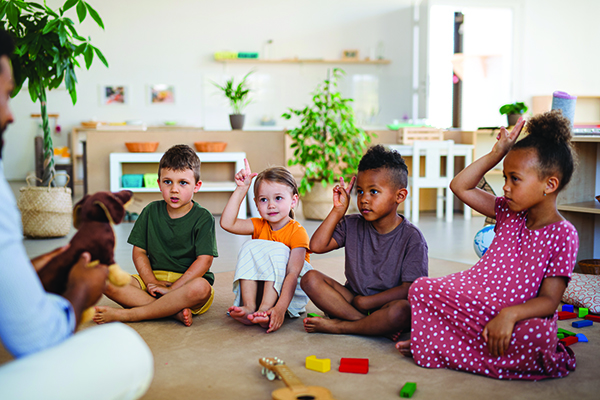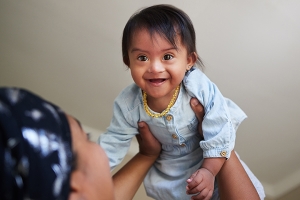
Playing with your baby yields much more than adorable smiles. According to child development experts, simple games boost baby’s brain development, fostering growth in language, math, science and organizational skills (aka executive functions), in addition to social and emotional learning.
Babies at play learn about themselves and their world, says Sarah R. Lytle, Ph.D. “Babies are natural scientists. They’re always playing games that are actually experiments. Every time a baby drops a spoon off their high chair, they’re figuring out their world and how it works.”
So, how to you help your little scientist? Here are easy games that improve cognitive development in a baby’s first 12 months.
Back and Forth
Quality interactions with loving caregivers are vital to cognitive development in general—things like responding to babies’ coos and cries, gazing into their eyes and making silly faces. “In a high-quality interaction, you want to see a true back-and-forth exchange between a parent and a baby. When the baby babbles, the parent responds like they’re having a conversation,” says Lytle.
Where’s the Cup?
By 4–7 months, babies begin developing object permanence (the knowledge that something still exists even when it’s not visible). Simple games like moving a cup just out of sight and asking “Where’s the cup?” help your baby toward this memory milestone.
Baby Gym
No, there’s no need to take your baby to spin class. But physical activity—tummy time, crawling, scooting, walking practice or parent-child swim—can boost brain growth. Canadian researchers found that physical activity benefits cognitive development, especially executive functions and language skills, in children from birth through age 5.
Why, Thank You!
When baby hands you a toy and looks at you expectantly, she is initiating a game that develops social and emotional intelligence, says Lytle. Play along by responding with delight (“Thank you so much!”), waiting a beat, then handing the toy back. Keep the back-and-forth going for as long as your baby stays interested.
Bust a Move
Exposing babies to music introduces the concept of rhythm, which benefits mathematical skills, says Lytle. Encourage this learning with mini dance sessions as early as the newborn stage (holding your baby, of course). Spend 5–10 minutes bouncing and swaying to the beat of songs you know and love.
Rhyme Time
Read books filled with rhyming words, like The Cat and the Hat, to help babies develop phonological awareness, an important component of language and literacy, says Lytle. “Books work well for this because as parents we don’t normally speak in rhymes. And we tend to get into verbal ruts and use the same words over and over again. Books expose babies to words and rhymes you might not normally use.”
Face It
Just hours after birth, babies show a preference for gazing at faces, which boosts visual development and cognitive growth. Stanford researchers found that by age 4 months, a baby’s facial recognition skills rival those of adults. A simple game like placing your face 10–12 inches from baby’s face, then switching with another person (or even a stuffed animal) and waiting for a response can help babies hone this important skill.
Skill-Building
That shape sorter you may have received at your baby shower is great for developing spatial awareness and mathematical ability, says Lytle. Once babies get a bit older, building blocks can help continue that development. “With blocks, babies are testing their environment and really getting into some complex concepts related to math, such as volume, distance and how structures work,” she says.
Baby Comedian
“Parents sometimes think that in order to build language skills they need to ‘fill their baby’s bucket’ with a lot of words,” says Lytle. “But the back-and-forth interaction is what really benefits cognitive growth.” Try responding to your baby’s early coos and first words with a hearty laugh, a squeal or a surprised face. The sillier the better, since babies are often delighted by these responses and more interested in keeping the interaction going.
I Get It
Playing together provides opportunities to boost social and emotional skills by helping babies understand and process emotions, says Lytle. “When your child becomes frustrated, talking about the emotions they’re feeling is important. When parents say ‘I understand why that made you upset,’ they’re scaffolding [or supporting] important social and emotional concepts.”
Focused, attentive interactions with loving caregivers are the best brain-builders, says Lytle. When caregivers play with babies, they can make the experience even more beneficial by focusing on their baby—putting down the phone and tuning out distractions. “To create a high-quality interaction, it’s important to be fully present and really focus your attention on your child.”
_____________
Malia Jacobson is a health and family journalist.
_____________














